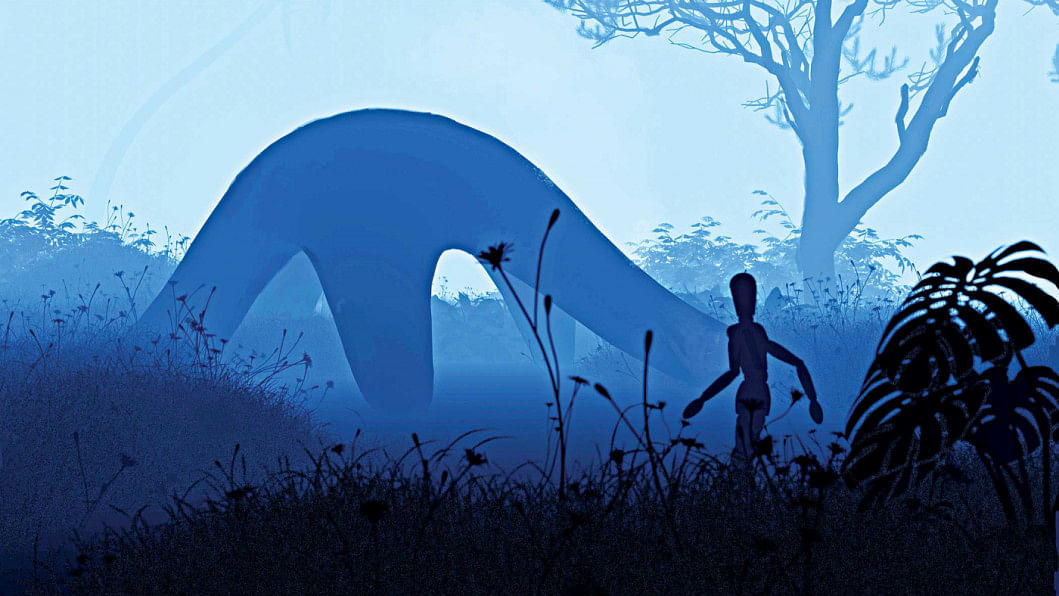No Man Ever Steps in the Same River Twice

He sleeps on his side, on his right side, to be specific. On the nights the excruciating pain on his right shoulder numbs him, he rolls over to his left. And he lies awake listening to the beat of his heart, aware of the uncomfortable proof of his vitality. In a city clamouring with cacophonous clout, his own rhythmic nostalgia keeps him up. His heart is damp – not the kind that makes moss grow. It's like a wet bathroom floor, with loose hair matted up in a corner and a cockroach occasionally making a run across. He blinks frequently, rapidly, in the fear that the darkness of the room will steal the light of his eyes, and darkness is all he will see. When daylight comes and he stands before the mirror, he is somewhat relieved every time to discover that his sight is intact, though he knows that the light had gone out of his eyes long, long ago.
It was forever ago that someone asked him where he was from. If he were younger, he would bask in the achievement of being seen as one of the city's natives. Not that he thinks about it, but he does know that there are no natives. They all are people who don't have a story to tell. They don't stand out, they are not camouflaged against the background – they are the camouflage. Something had to be given up for a place in the city, and by default no one ever talks about it. He does not either, but fleeting thoughts get to him, occasionally. In the scalding noons that leave an imprint like blisters on a stray dog's back by boiling water thrown by some barbarian, his fingers click against the calculator buttons grown smooth upon use. The monotony of the routine work lets a fragment of his mind drift to crevices unknown to him.
In the far north of the land is where he was born. It was said to be a place drier than bones, and yet the earliest memory he holds is of a river – one which would turn into a grazing spot for the cattle and a battlefield for the people who wanted to claim it as their long lost land, their Atlantis, to grow crops on. In the monsoon months – if it came, that is – the barren valley would develop a semblance of a regal pride, with water flowing to the south like words rolling off a preacher's tongue. The river was domesticated; it did not yearn for offerings of human or animal soul every year. The residents would take the river away in buckets and pots to replenish their produce. He did not. He would sit by the river and write poems in his head. One of his teachers believed that only the broken-hearted could write, and hence was deeply concerned about him. He wasn't aware of his broken heart, even when it glowed blue.
The teacher, in a way, was right. Like some law in high school physics that stated that energy cannot be made, only transformed – if people did indeed have souls, it worked in the same way. The artists and the writers took the shards of their own splintered heart and moulded it into their own creation. Some kept their grief burning to experience the joy of creation – a necessary sacrifice in their eyes. Some used up their share and were outlines of people they used to be, bare silhouettes. The burden of being a shell became too much for few, like Hemingway. And then there were those who could live without living.
He can't remember the last poem he wrote, the last time he scratched furiously to get his thoughts on paper. The nib tearing into the paper, the erratic lines spoke of passion unsaid. His words were disciplined now, all within neat boxes of equal space. The rivulet that flowed inside him was replaced by the offspring of Dhaleshwari, with inky, murky water. He lies between his plush sheets, to his left. The drawer at his feet contained all of his financial statements for the year, which he knows by heart. What he does not know is, whether it's enough to buy him back a river he crossed over, many moons ago.
Upoma Aziz is a slouching, crouching, grouchy goblin with a hoarding addiction. You can reach out to her at [email protected], but there is a possibility it will get buried under the mail she's hoarded.

 For all latest news, follow The Daily Star's Google News channel.
For all latest news, follow The Daily Star's Google News channel. 



Comments